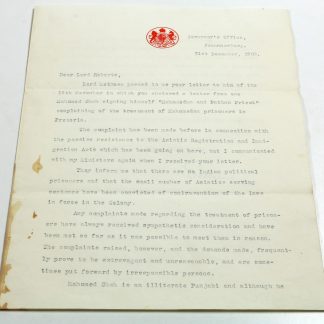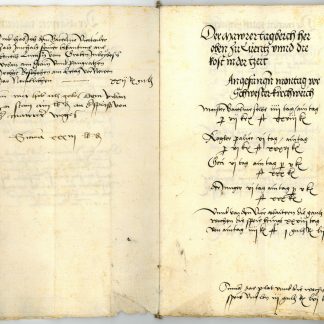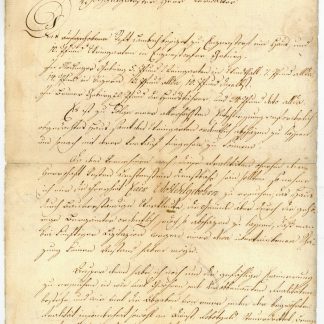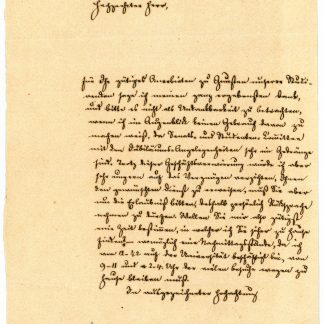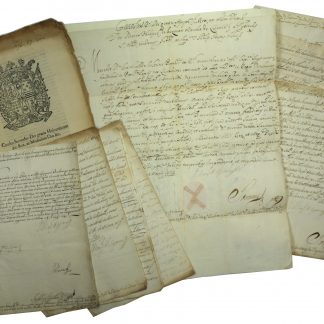Governing Milan in times of war
7 documents and 1 officer's commission signed. Together with 1 printed decree.
Folio. 11¾ (½+1+2½+3+1+2½+½+¾) pp. and (8) pp. With woodcut arms and ms. annotation.
€ 2,500.00
The grandson of the famous politician and art collector Diego Felipéz de Guzmán (1580-1655) enjoyed a successful political career in his own right during the reign of Charles II of Spain. Upon his father's death in 1666, he briefly succeeded him as viceroy of Valencia. Later Guzmán served as viceroy of Catalonia (1678 and 1685-88) and as viceroy of Navarre (1684). In 1691 he was appointed governor of the Duchy of Milan, a powerful office that his grandfather, whose name he assumed, had held before him. During the War of Spanish Succession he remained loyal to the Habsburgs. Diego Dávila Mesía de Guzmán died without issue in 1711. The documents at hand span almost the entirety of Guzmán's mandate in Milan (1691-98).
The most remarkable item in the collection is a decree from 4 August 1694 concerning a diplomatic conflict between Spain and France. In the course of a lawsuit against a French subject accused of handling stolen goods, a diplomatic note by the French ambassador Pierre de Vilars (1623-98), related to a different affair, had surfaced. Vilars intervened in a conflict about the inheritance of the French merchant Philibert Vignon (1565-1630) who had died in Milan of the plague. Executing the last will of his uncle, Vignon's nephew and heir endowed the famous Hôtel-Dieu in Lyon with the considerable inheritance, but the government of Milan confiscated the funds for its own budget. The expropriation was based on a ruling of the so-called "Junta de Represalias", a commercial court that was established as a protectionist means of economic warfare. According to the decree, the sum in question amounted to 117,000 Livres; Vilars demanded to be reimbursed with interest. Pointing to the Nine Years' War (1688-97), also fought in Catalonia and Northern Italy, Guzmán rejects Vilars' demands and affirms the legality of the dispossession: "Y Considerando ahora la Junta, que con la presente guerra no hay duda que este Caudal assi principal como interesses me toca por legitima Represalia y que combiene se determine assi y anote en los libros de la Thessoreria General de ese Estado de Milan paraque la Real hacienda que de libre y no se le pueda combenir por esto; He Resuelto conformarme en todo con el sentir de la Junta por las Razones y fundamentos que van expressados y os mando deis las ordenes necessarias a su cumplimiento [...]".
Only after the War of the Spanish Succession did the Spanish authorities eventually carry out Vignon's last will: he is listed among the donors of Hôtel-Dieu in Lyon.
Six documents in the collection are royal orders for payments and gratifications on behalf of Spanish and Milanese subjects. An officer's commission for Angelo Belotto was issued on 9 March 1694.
The printed decree from 29 Dec. 1693 is a renewal of the royal monopoly on tobacco in the Duchy of Milan with detailed legal regulations.
All manuscript documents are counter-signed several times and annoted, five documents with papered seals. Generally in good condition, with some creases and occasional browning to the edges, especially in the printed decree. The officer's commission is somewhat brittle in the folds.
Alessandro Buono, Eredi rituali e conflitti giurisdizionali nella Monarchia Spagnola di antico regime, in: Quaderni Storici, 3/2019.


